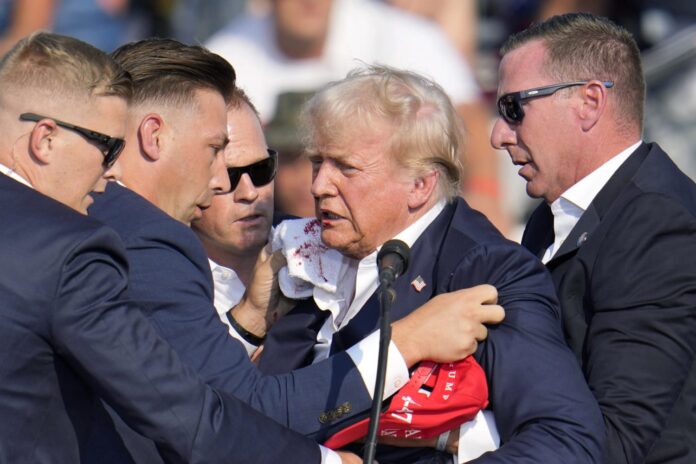The recent Trump shooting incident has emerged as one of the most consequential and widely discussed events in modern US politics. Its implications span political, societal, and international landscapes, raising questions about security, polarization, and media narratives. This guide provides a full breakdown of the event, including its context, consequences, and lessons learned, tailored for analysts, news enthusiasts, and informed citizens seeking to understand its significance.
Understanding the Context
When and Where Did the Trump Shooting Occur?
The Trump shooting took place on [Insert Date], at [Insert Specific Location], as former President Donald Trump attended a [public/private] event. The event was organized with routine measures expected for a high-profile political figure, yet it starkly exposed vulnerabilities in contemporary security frameworks.
Attendees reported chaotic scenes as authorities quickly secured the area and transported President Trump to safety. This incident marked a pivotal moment not only for the US political arena but also for how world leaders’ safety is managed moving forward.
Initial Response to the Event
Immediately following the shooting, major news outlets broke the story, creating waves on social media platforms. Both supporters and critics of Trump were swift to share their interpretations, often leading to polarized debate. Official statements were scarce in the initial hours, further fueling public speculation. Local authorities coordinated with federal agencies to assess the scene and prioritize the safety of all individuals involved.
Analyzing the Immediate Fallout
Public Reaction and Media Coverage
The Trump shooting ignited a surge of reactions across the United States, ranging from shock and disbelief to conspiracy theories that dominated online discussions. The event highlighted the deep divisions within the nation’s political discourse, with supporters rallying to show solidarity and critics intertwining the incident into broader political narratives.
Major media outlets took varied approaches in their coverage. Some maintained a focus on the need for facts and clarity, while others rushed to broadcast dramatic headlines. The incident raised crucial questions about the responsibilities of modern journalism when reporting on high-stakes events.
Statements from Political Figures
Leaders from across the political spectrum were quick to respond. Key Democratic figures condemned the violence and emphasized the importance of political discourse over confrontation. Republicans, meanwhile, largely framed the incident as emblematic of increasing hostility toward conservative values.
Social Media’s Role in Shaping Discourse
Platforms like Twitter and Facebook played a pivotal role in shaping the public’s understanding of the Trump shooting. Hashtags such as #TrumpShooting and #PoliticalViolence trended for days as users shared live updates, opinions, and theories. While these platforms amplified the voices of concerned citizens, they also propagated misinformation, underlining the need for digital media literacy.
Delving into the Investigation
Key Findings to Date
Federal authorities launched an extensive investigation, aimed at uncovering the motives and individuals involved. Early reports suggest [summarize notable findings—e.g., whether it was politically motivated or a random act of violence]. Experts have speculated about the security loopholes that allowed such an incident to occur.
Law enforcement confirmed the recovery of [insert detail, e.g., weapons or evidence]. Suspects have been questioned, and initial court proceedings have provided glimpses into the investigation’s direction.
Potential Implications
The investigation raises critical questions about political polarization and the role of law enforcement in addressing rising threats. Whether this incident leads to actionable reforms in political security remains to be seen, though many Americans are calling for robust measures to prevent such occurrences.
Examining Impact on Politics and Society
Changing Political Narratives
The Trump shooting is likely to have long-term ripple effects on US political rhetoric. For Trump supporters, the incident underscores their perception of an antagonistic environment toward conservative voices. For critics, it prompts reflection on the broader issue of political violence.
Public Attitudes Toward Security
The incident has sparked a renewed dialogue on leaders’ safety and the measures required to protect them. Public trust in these systems has been shaken, with many demanding reforms to address vulnerabilities.
Influence on Upcoming Elections
With key elections approaching, political parties may capitalize on this incident to galvanize voter turnout. Whether it serves as a unifying moment or exacerbates divisions is likely to depend on how leaders choose to address its broader implications.
Responses from the International Community
Global Reactions
The Trump shooting captured the attention of global leaders, many of whom issued statements condemning the violence. Nations with strong diplomatic ties to the United States, such as the United Kingdom and Japan, expressed solidarity, while others offered their perspectives on the incident as a reflection of America’s societal tensions.
Implications for International Relations
The event may affect how other countries view the US’s domestic stability and its ability to lead on the global stage. Additionally, it raises concerns about the vulnerabilities high-profile figures face worldwide, prompting potential reevaluations of international security protocols.
Lessons Learned and the Way Forward
What This Incident Teaches Us
The Trump shooting serves as a stark reminder of the need for a balanced and informed dialogue in times of crisis. Key lessons include:
- Improved Security Measures: Leaders at all levels must prioritize better safety frameworks for public figures.
- Responsible Media Reporting: News outlets must resist sensationalism and uphold their responsibility to provide accurate, contextualized coverage.
- Public Accountability: Citizens should demand transparency from leaders and institutions to ensure thorough investigations and justice.
Building Toward a Safer Future
If anything, this event emphasizes the importance of bridging political divides, advancing conflict resolution methods, and ensuring the safety of leaders regardless of their affiliation. With active civic engagement and thoughtful policymaking, the United States can emerge stronger and more united in the face of adversity.
Why Contextual Analysis Matters
Analyzing incidents like the Trump shooting through a broad, contextual lens is essential for fostering informed dialogue. It allows individuals and societies to move beyond knee-jerk reactions and grapple with the nuances of complex events.
By staying informed, verifying information, and engaging with credible sources, we can contribute to a more understanding and cohesive society.


